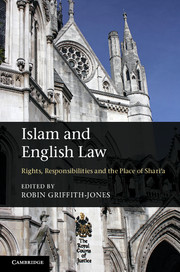Book contents
- Frontmatter
- Contents
- List of contributors
- List of abbreviations
- Preface
- Introduction
- Part I The Archbishop of Canterbury and shariʽa law
- Part II The Archbishop’s proposal for ‘transformative accommodation’
- Shariʽa and secular democracy: is Islamic law compatible with the European Convention on Human Rights?
- Legal pluralism: should English law give greater recognition to Islamic law?
- 7 Family law: current conflicts and their resolution
- 8 Islamic finance, alternative dispute resolution and family law: developments towards legal pluralism?
- 9 Judging Muslims
- 10 From Muslim migrants to Muslim citizens
- 11 Ontario’s ‘shariʽa court’: law and politics intertwined
- Accommodation or conflict: trajectories in the United Kingdom
- Part III Responsibilities and rights
- Part IV Prospect: equality before God and before the law
- Select bibliography
- Index of cases
- Index
7 - Family law: current conflicts and their resolution
Published online by Cambridge University Press: 05 April 2013
- Frontmatter
- Contents
- List of contributors
- List of abbreviations
- Preface
- Introduction
- Part I The Archbishop of Canterbury and shariʽa law
- Part II The Archbishop’s proposal for ‘transformative accommodation’
- Shariʽa and secular democracy: is Islamic law compatible with the European Convention on Human Rights?
- Legal pluralism: should English law give greater recognition to Islamic law?
- 7 Family law: current conflicts and their resolution
- 8 Islamic finance, alternative dispute resolution and family law: developments towards legal pluralism?
- 9 Judging Muslims
- 10 From Muslim migrants to Muslim citizens
- 11 Ontario’s ‘shariʽa court’: law and politics intertwined
- Accommodation or conflict: trajectories in the United Kingdom
- Part III Responsibilities and rights
- Part IV Prospect: equality before God and before the law
- Select bibliography
- Index of cases
- Index
Summary
Should English law be giving greater recognition to Islamic law? The question is widely discussed; but we must tread with caution. This is an area of particular importance and sensitivity. The matter is not well understood in the public at large and the printed media in particular, as the fall-out from the Archbishop of Canterbury’s lecture on the subject bears witness. From our own perspectives, respectively as a former family judge and a scholar of law and religion, we reflect on the relationship between English family law and families who live in the UK and are British citizens, but who have their own separate culture, family traditions and religious system, which may have an impact upon their family disputes.
English family law
English family law is entirely based upon statute law and the decisions of judges interpreting those statutes. Marriage and divorce remain matters exclusively for the civil law of this country. (Whilst the Church of England is empowered to solemnise matrimony, and legally obliged to do so in the case of parishioners, its ministers act as civil registrars on behalf of the state for these purposes.) The jurisdiction of the civil courts on ancillary matters within divorce proceedings, such as the upbringing of children, cannot be ousted.
- Type
- Chapter
- Information
- Islam and English LawRights, Responsibilities and the Place of Shari'a, pp. 108 - 115Publisher: Cambridge University PressPrint publication year: 2013
- 1
- Cited by

